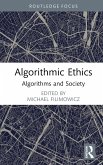Computer Ethics
Herausgeber: Weckert, John
Computer Ethics
Herausgeber: Weckert, John
- Broschiertes Buch
- Merkliste
- Auf die Merkliste
- Bewerten Bewerten
- Teilen
- Produkt teilen
- Produkterinnerung
- Produkterinnerung
These essays focus on the study of the ethical issues related to computer use. Grouped into sections, the essays cover all the important issues ranging from the history and nature of computer ethics, cyberspace, values and technology, and responsibility and professionalism, to privacy and surveillance, what computers should not do, and morality and machines.
Andere Kunden interessierten sich auch für
![Management Consultancy Management Consultancy]() Morgen Witzel (UK University of Exeter)Management Consultancy89,99 €
Morgen Witzel (UK University of Exeter)Management Consultancy89,99 €![Learning Legal Skills and Reasoning Learning Legal Skills and Reasoning]() Sharon Hanson (UK Canterbury Christ Church University)Learning Legal Skills and Reasoning103,99 €
Sharon Hanson (UK Canterbury Christ Church University)Learning Legal Skills and Reasoning103,99 €![Algorithmic Ethics Algorithmic Ethics]() Algorithmic Ethics74,99 €
Algorithmic Ethics74,99 €![English-French Translation English-French Translation]() Christophe Gagne (UK The University of Cambridge)English-French Translation57,99 €
Christophe Gagne (UK The University of Cambridge)English-French Translation57,99 €![Teach Now! English Teach Now! English]() Alex Quigley (UK Huntington School)Teach Now! English39,99 €
Alex Quigley (UK Huntington School)Teach Now! English39,99 €![Anthropology and/as Education Anthropology and/as Education]() Tim IngoldAnthropology and/as Education59,99 €
Tim IngoldAnthropology and/as Education59,99 €![Designing for Depth in the Classroom Designing for Depth in the Classroom]() Andi McNair (USA Education Service Center Region 12)Designing for Depth in the Classroom31,99 €
Andi McNair (USA Education Service Center Region 12)Designing for Depth in the Classroom31,99 €-
-
-
These essays focus on the study of the ethical issues related to computer use. Grouped into sections, the essays cover all the important issues ranging from the history and nature of computer ethics, cyberspace, values and technology, and responsibility and professionalism, to privacy and surveillance, what computers should not do, and morality and machines.
Hinweis: Dieser Artikel kann nur an eine deutsche Lieferadresse ausgeliefert werden.
Hinweis: Dieser Artikel kann nur an eine deutsche Lieferadresse ausgeliefert werden.
Produktdetails
- Produktdetails
- The International Library of Essays in Public and Professional Ethics
- Verlag: Taylor & Francis Ltd
- Seitenzahl: 516
- Erscheinungstermin: 10. Juni 2019
- Englisch
- Abmessung: 254mm x 178mm x 28mm
- Gewicht: 952g
- ISBN-13: 9781138383517
- ISBN-10: 1138383511
- Artikelnr.: 57042425
- Herstellerkennzeichnung
- Libri GmbH
- Europaallee 1
- 36244 Bad Hersfeld
- gpsr@libri.de
- The International Library of Essays in Public and Professional Ethics
- Verlag: Taylor & Francis Ltd
- Seitenzahl: 516
- Erscheinungstermin: 10. Juni 2019
- Englisch
- Abmessung: 254mm x 178mm x 28mm
- Gewicht: 952g
- ISBN-13: 9781138383517
- ISBN-10: 1138383511
- Artikelnr.: 57042425
- Herstellerkennzeichnung
- Libri GmbH
- Europaallee 1
- 36244 Bad Hersfeld
- gpsr@libri.de
John Weckert is a Professorial Fellow at the Centre for Applied Philosophy and Public Ethics, Charles Sturt University, Australia.
Contents: Series Preface; Introduction; Part I Computer Ethics - Its History and Nature: Ethical challenges to citizens of 'the automatic age': Norbert Wiener on the information society
Terrell Ward Bynum; Some Moral and technical consequences of automation
Norbert Wiener; Rules of ethics in information processing
Donn B Parker; The 2 cultures of the computer age
Joseph Weizenbaum; On the impact of the computer on society: how does one insult a machine?
Joseph Weizenbaum; What is computer ethics?
James H. Moor; 4 ethical issues of the information age
Richard O. Mason; Is there an ethics of computing?
Geoffrey Brown; The use and abuse of computer ethics
Donald Gotterbarn; Information ethics: on the philosophical foundations of computer ethics
Luciano Floridi. Part II Cyberspace: Balancing intellectual property rights and the intellectual commons: a Lockean analysis
Herman T. Tavani; What is so bad about internet content regulation?
John Weckert; Unreal friends
Dean Cocking and Steve Matthews; Developing trust on the internet
Victoria McGreer; The computer revolution and the problem of global ethics
Krystyna Gorniak-Kocikowska; Computer-mediated colonization
the renaissance
and educational imperatives for an intercultural global village
Charles Ess; Shaping the web: why the politics of search engines matters
Lucas D. Introna and Helen Nissenbaum; Part III Values and Technology: Do artefacts have politics?
Langdon Winner; Towards ethical principles for designing politico-administrative information systems
M.J. van den Hoven; Bias in computer systems
Batya Friedman and Helen Nissenbaum; Method in computer ethics: towards a multi-level interdisciplinary approach
Philip Brey. Part IV Responsibility and Professionalism: Human agency and responsible computing: implications for computer system design
Batya Friedman and Peter H. Kahn Jr ; Informatics and professional responsibility
David Gotterbarn; Do engineers have social responsibilities?
Deborah G. Johnson; Computing and accountability
Helen Nissenbaum; Using the new ACM code of ethics in decision making
Ronald E. Anderson
Deborah G. Johnson
Donald Gotterbarn and Judith Perolle. Part V Privacy and Surveillance: Are computer hacker break-ins ethical?
Eugene H. Spafford; A moral approach to electronic patient records
N.B. Fairweather and S. Rogerson; Privacy and the varieties of informational wrongdoing
Jeroen van den Hoven; Protecting privacy in an information age: the problem of privacy in public
Helen Nissenbaum; Privacy
the workplace and the internet
Seumas Miller and John Weckert; Surveillance in employment: the case of teleworking
N. Ben Fairweather. Part VI What Computers Should Not Do: Are there decisions computers should never make? James H. Moore; Computers in control: rational transfer of authority or irresponsible abdication of autonomy? Arthur Kuflik; On becoming redundant or what computers shouldn't do
James Lenman. Part VII Morality and Machines: Men
machines
materialism
and morality
Peter T. Manicas; Can robots be moral?
Laszlo Versenyi ; A code of conduct for robots coexisting with human beings
Shigeo Hirose; Information
ethics
and computers: the problem of autonomous moral agents
Bernd Carsten Stahl; Name Index.
Terrell Ward Bynum; Some Moral and technical consequences of automation
Norbert Wiener; Rules of ethics in information processing
Donn B Parker; The 2 cultures of the computer age
Joseph Weizenbaum; On the impact of the computer on society: how does one insult a machine?
Joseph Weizenbaum; What is computer ethics?
James H. Moor; 4 ethical issues of the information age
Richard O. Mason; Is there an ethics of computing?
Geoffrey Brown; The use and abuse of computer ethics
Donald Gotterbarn; Information ethics: on the philosophical foundations of computer ethics
Luciano Floridi. Part II Cyberspace: Balancing intellectual property rights and the intellectual commons: a Lockean analysis
Herman T. Tavani; What is so bad about internet content regulation?
John Weckert; Unreal friends
Dean Cocking and Steve Matthews; Developing trust on the internet
Victoria McGreer; The computer revolution and the problem of global ethics
Krystyna Gorniak-Kocikowska; Computer-mediated colonization
the renaissance
and educational imperatives for an intercultural global village
Charles Ess; Shaping the web: why the politics of search engines matters
Lucas D. Introna and Helen Nissenbaum; Part III Values and Technology: Do artefacts have politics?
Langdon Winner; Towards ethical principles for designing politico-administrative information systems
M.J. van den Hoven; Bias in computer systems
Batya Friedman and Helen Nissenbaum; Method in computer ethics: towards a multi-level interdisciplinary approach
Philip Brey. Part IV Responsibility and Professionalism: Human agency and responsible computing: implications for computer system design
Batya Friedman and Peter H. Kahn Jr ; Informatics and professional responsibility
David Gotterbarn; Do engineers have social responsibilities?
Deborah G. Johnson; Computing and accountability
Helen Nissenbaum; Using the new ACM code of ethics in decision making
Ronald E. Anderson
Deborah G. Johnson
Donald Gotterbarn and Judith Perolle. Part V Privacy and Surveillance: Are computer hacker break-ins ethical?
Eugene H. Spafford; A moral approach to electronic patient records
N.B. Fairweather and S. Rogerson; Privacy and the varieties of informational wrongdoing
Jeroen van den Hoven; Protecting privacy in an information age: the problem of privacy in public
Helen Nissenbaum; Privacy
the workplace and the internet
Seumas Miller and John Weckert; Surveillance in employment: the case of teleworking
N. Ben Fairweather. Part VI What Computers Should Not Do: Are there decisions computers should never make? James H. Moore; Computers in control: rational transfer of authority or irresponsible abdication of autonomy? Arthur Kuflik; On becoming redundant or what computers shouldn't do
James Lenman. Part VII Morality and Machines: Men
machines
materialism
and morality
Peter T. Manicas; Can robots be moral?
Laszlo Versenyi ; A code of conduct for robots coexisting with human beings
Shigeo Hirose; Information
ethics
and computers: the problem of autonomous moral agents
Bernd Carsten Stahl; Name Index.
Contents: Series Preface; Introduction; Part I Computer Ethics - Its History and Nature: Ethical challenges to citizens of 'the automatic age': Norbert Wiener on the information society
Terrell Ward Bynum; Some Moral and technical consequences of automation
Norbert Wiener; Rules of ethics in information processing
Donn B Parker; The 2 cultures of the computer age
Joseph Weizenbaum; On the impact of the computer on society: how does one insult a machine?
Joseph Weizenbaum; What is computer ethics?
James H. Moor; 4 ethical issues of the information age
Richard O. Mason; Is there an ethics of computing?
Geoffrey Brown; The use and abuse of computer ethics
Donald Gotterbarn; Information ethics: on the philosophical foundations of computer ethics
Luciano Floridi. Part II Cyberspace: Balancing intellectual property rights and the intellectual commons: a Lockean analysis
Herman T. Tavani; What is so bad about internet content regulation?
John Weckert; Unreal friends
Dean Cocking and Steve Matthews; Developing trust on the internet
Victoria McGreer; The computer revolution and the problem of global ethics
Krystyna Gorniak-Kocikowska; Computer-mediated colonization
the renaissance
and educational imperatives for an intercultural global village
Charles Ess; Shaping the web: why the politics of search engines matters
Lucas D. Introna and Helen Nissenbaum; Part III Values and Technology: Do artefacts have politics?
Langdon Winner; Towards ethical principles for designing politico-administrative information systems
M.J. van den Hoven; Bias in computer systems
Batya Friedman and Helen Nissenbaum; Method in computer ethics: towards a multi-level interdisciplinary approach
Philip Brey. Part IV Responsibility and Professionalism: Human agency and responsible computing: implications for computer system design
Batya Friedman and Peter H. Kahn Jr ; Informatics and professional responsibility
David Gotterbarn; Do engineers have social responsibilities?
Deborah G. Johnson; Computing and accountability
Helen Nissenbaum; Using the new ACM code of ethics in decision making
Ronald E. Anderson
Deborah G. Johnson
Donald Gotterbarn and Judith Perolle. Part V Privacy and Surveillance: Are computer hacker break-ins ethical?
Eugene H. Spafford; A moral approach to electronic patient records
N.B. Fairweather and S. Rogerson; Privacy and the varieties of informational wrongdoing
Jeroen van den Hoven; Protecting privacy in an information age: the problem of privacy in public
Helen Nissenbaum; Privacy
the workplace and the internet
Seumas Miller and John Weckert; Surveillance in employment: the case of teleworking
N. Ben Fairweather. Part VI What Computers Should Not Do: Are there decisions computers should never make? James H. Moore; Computers in control: rational transfer of authority or irresponsible abdication of autonomy? Arthur Kuflik; On becoming redundant or what computers shouldn't do
James Lenman. Part VII Morality and Machines: Men
machines
materialism
and morality
Peter T. Manicas; Can robots be moral?
Laszlo Versenyi ; A code of conduct for robots coexisting with human beings
Shigeo Hirose; Information
ethics
and computers: the problem of autonomous moral agents
Bernd Carsten Stahl; Name Index.
Terrell Ward Bynum; Some Moral and technical consequences of automation
Norbert Wiener; Rules of ethics in information processing
Donn B Parker; The 2 cultures of the computer age
Joseph Weizenbaum; On the impact of the computer on society: how does one insult a machine?
Joseph Weizenbaum; What is computer ethics?
James H. Moor; 4 ethical issues of the information age
Richard O. Mason; Is there an ethics of computing?
Geoffrey Brown; The use and abuse of computer ethics
Donald Gotterbarn; Information ethics: on the philosophical foundations of computer ethics
Luciano Floridi. Part II Cyberspace: Balancing intellectual property rights and the intellectual commons: a Lockean analysis
Herman T. Tavani; What is so bad about internet content regulation?
John Weckert; Unreal friends
Dean Cocking and Steve Matthews; Developing trust on the internet
Victoria McGreer; The computer revolution and the problem of global ethics
Krystyna Gorniak-Kocikowska; Computer-mediated colonization
the renaissance
and educational imperatives for an intercultural global village
Charles Ess; Shaping the web: why the politics of search engines matters
Lucas D. Introna and Helen Nissenbaum; Part III Values and Technology: Do artefacts have politics?
Langdon Winner; Towards ethical principles for designing politico-administrative information systems
M.J. van den Hoven; Bias in computer systems
Batya Friedman and Helen Nissenbaum; Method in computer ethics: towards a multi-level interdisciplinary approach
Philip Brey. Part IV Responsibility and Professionalism: Human agency and responsible computing: implications for computer system design
Batya Friedman and Peter H. Kahn Jr ; Informatics and professional responsibility
David Gotterbarn; Do engineers have social responsibilities?
Deborah G. Johnson; Computing and accountability
Helen Nissenbaum; Using the new ACM code of ethics in decision making
Ronald E. Anderson
Deborah G. Johnson
Donald Gotterbarn and Judith Perolle. Part V Privacy and Surveillance: Are computer hacker break-ins ethical?
Eugene H. Spafford; A moral approach to electronic patient records
N.B. Fairweather and S. Rogerson; Privacy and the varieties of informational wrongdoing
Jeroen van den Hoven; Protecting privacy in an information age: the problem of privacy in public
Helen Nissenbaum; Privacy
the workplace and the internet
Seumas Miller and John Weckert; Surveillance in employment: the case of teleworking
N. Ben Fairweather. Part VI What Computers Should Not Do: Are there decisions computers should never make? James H. Moore; Computers in control: rational transfer of authority or irresponsible abdication of autonomy? Arthur Kuflik; On becoming redundant or what computers shouldn't do
James Lenman. Part VII Morality and Machines: Men
machines
materialism
and morality
Peter T. Manicas; Can robots be moral?
Laszlo Versenyi ; A code of conduct for robots coexisting with human beings
Shigeo Hirose; Information
ethics
and computers: the problem of autonomous moral agents
Bernd Carsten Stahl; Name Index.








